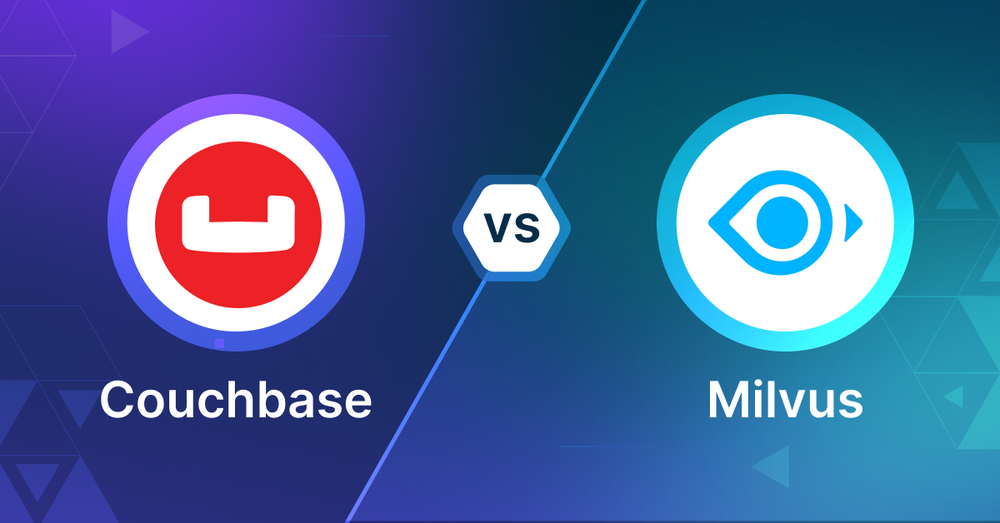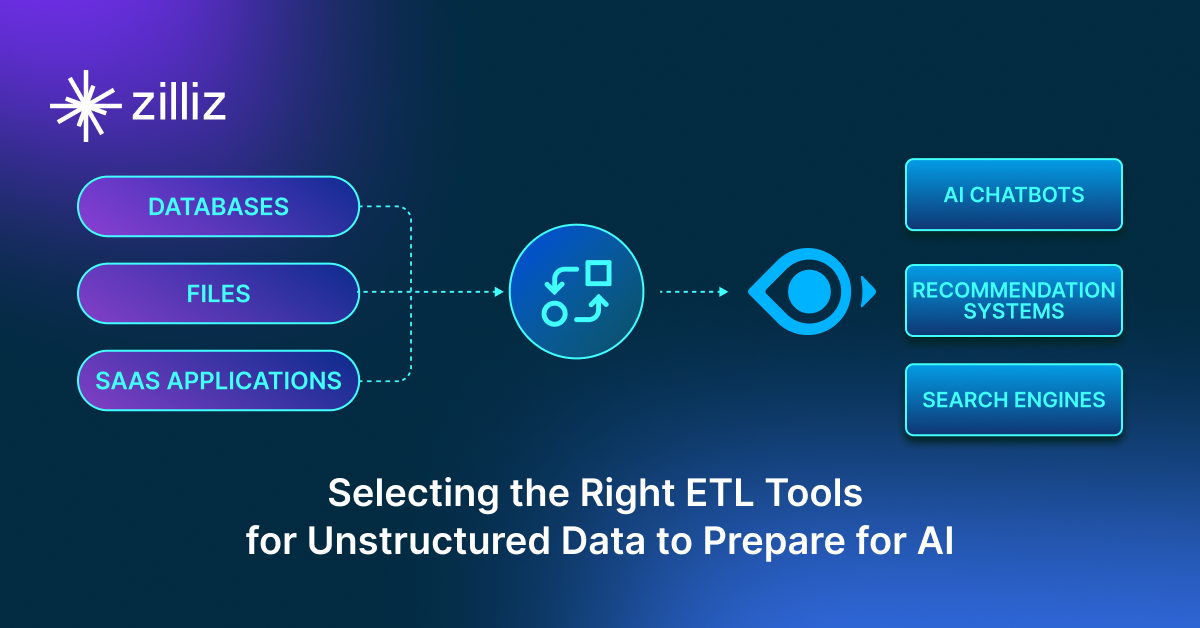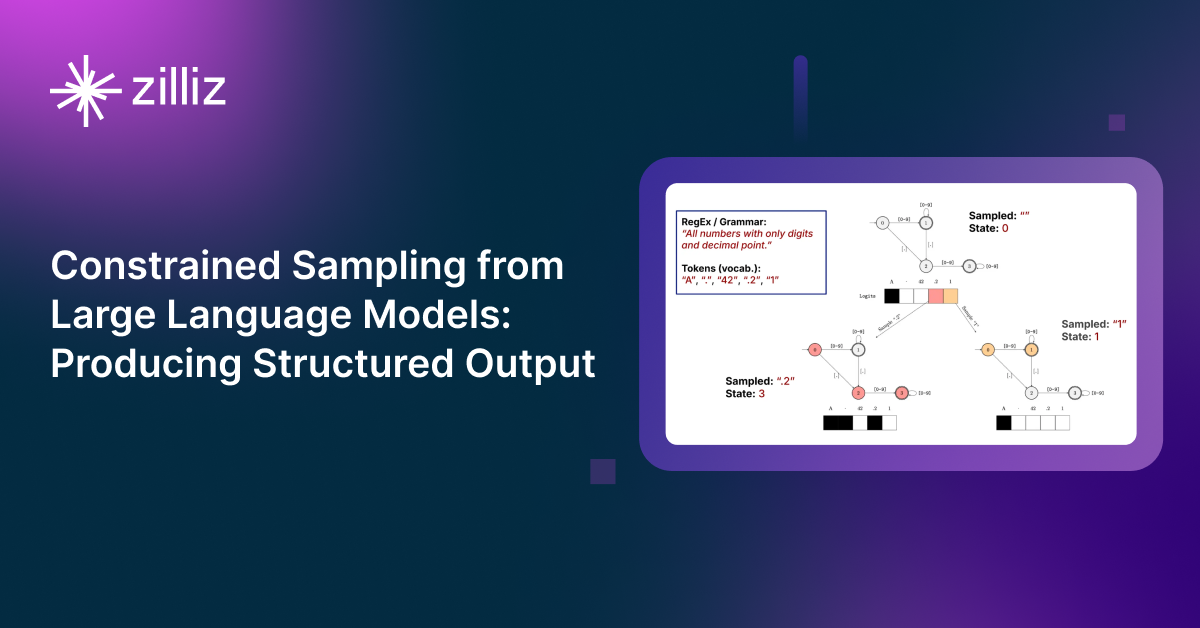Couchbase vs Milvus: Choosing the Right Vector Database for Your AI Apps

What is a Vector Database?
Before we compare Couchbase and Milvus, let's first explore the concept of vector databases.
A vector database is specifically designed to store and query high-dimensional vectors, which are numerical representations of unstructured data. These vectors encode complex information, such as the semantic meaning of text, the visual features of images, or product attributes. By enabling efficient similarity searches, vector databases play a pivotal role in AI applications, allowing for more advanced data analysis and retrieval.
Common use cases for vector databases include e-commerce product recommendations, content discovery platforms, anomaly detection in cybersecurity, medical image analysis, and natural language processing (NLP) tasks. They also play a crucial role in Retrieval Augmented Generation (RAG), a technique that enhances the performance of large language models (LLMs) by providing external knowledge to reduce issues like AI hallucinations.
There are many types of vector databases available in the market, including:
- Purpose-built vector databases such as Milvus, Zilliz Cloud (fully managed Milvus)
- Vector search libraries such as Faiss and Annoy.
- Lightweight vector databases such as Chroma and Milvus Lite.
- Traditional databases with vector search add-ons capable of performing small-scale vector searches.
Couchbase is distributed multi-model NoSQL document-oriented database with vector search capabilities as an add-on and Milvus is a purpose built vector database.
What is Couchbase? An Overview
Couchbase is a distributed, open-source, NoSQL database that can be used to build applications for cloud, mobile, AI, and edge computing. It combines the strengths of relational databases with the versatility of JSON. Couchbase also provides the flexibility to implement vector search despite not having native support for vector indexes. Developers can store vector embeddings—numerical representations generated by machine learning models—within Couchbase documents as part of their JSON structure. These vectors can be used in similarity search use cases, such as recommendation systems or retrieval-augmented generation both based on semantic search, where finding data points close to each other in a high-dimensional space is important.
One approach to enabling vector search in Couchbase is by leveraging Full Text Search (FTS). While FTS is typically designed for text-based search, it can be adapted to handle vector searches by converting vector data into searchable fields. For instance, vectors can be tokenized into text-like data, allowing FTS to index and search based on those tokens. This can facilitate approximate vector search, providing a way to query documents with vectors that are close in similarity.
Alternatively, developers can store the raw vector embeddings in Couchbase and perform the vector similarity calculations at the application level. This involves retrieving documents and computing metrics such as cosine similarity or Euclidean distance between vectors to identify the closest matches. This method allows Couchbase to serve as a storage solution for vectors while the application handles the mathematical comparison logic.
For more advanced use cases, some developers integrate Couchbase with specialized libraries or algorithms (like FAISS or HNSW) that enable efficient vector search. These integrations allow Couchbase to manage the document store while the external libraries perform the actual vector comparisons. In this way, Couchbase can still be part of a solution that supports vector search.
By using these approaches, Couchbase can be adapted to handle vector search functionality, making it a flexible option for various AI and machine learning tasks that rely on similarity searches.
Overview of the Milvus Vector Database
Milvus is an open-source vector database designed from the ground up for vector search and similarity search at its core. It is highly performant and horizontally scalable at a billion scale and can run efficiently across a wide range of environments, from laptops to large-scale distributed systems. Milvus is available as both open-source software and a cloud service (Zilliz Cloud).
Milvus supports at least 11 indexing methods, including HNSW (Hierarchical Navigable Small World), IVF (Inverted File), DiskANN, and CAGRA, allowing it to quickly search through large volumes of data. Unlike Cassandra, Milvus is not a general-purpose database but a focused tool for unstructured data and vector similarity search, making it a more specialized solution.
Milvus is part of the LF AI & Data Foundation and is licensed under Apache 2.0. Many contributors are experts in high-performance computing (HPC), with backgrounds in building and optimizing large-scale systems. Key contributors include professionals from companies like Zilliz, ARM, NVIDIA, AMD, Intel, Meta, IBM, Salesforce, and Microsoft.
Milvus offers three deployment options: Milvus Lite, Standalone, and Distributed.
- Milvus Lite is a Python library and an ultra-lightweight version of Milvus. It’s perfect for rapid prototyping in Python or notebook environments and for small-scale local experiments.
- Milvus Standalone is the single-node deployment option for Milvus, using a client-server model. You can think of it as the Milvus equivalent of MySQL, while Milvus Lite is like SQLite.
- Milvus Distributed is Milvus's distributed mode, ideal for enterprise users building large-scale vector database systems or vector data platforms.
Key Differences
Search Methodology:
Couchbase adapts existing features like Full Text Search (FTS) for vector search. It requires converting vector data into searchable fields or performing similarity calculations at the application level. In contrast, Milvus is built specifically for vector search, offering multiple indexing methods like HNSW, IVF, DiskANN, and CAGRA. This makes Milvus more efficient for native vector similarity searches.
Data Handling:
Couchbase is a NoSQL database that handles structured and semi-structured data well, especially JSON format. It can store vector embeddings within JSON structures. Milvus, however, is designed primarily for unstructured data and vector representations. It excels in managing and searching large volumes of vector data but may not be as versatile for general-purpose database needs. Milvus does have support for JSON fields, such as inserting JSON values as well as searching and querying in JSON fields with basic and advanced operators.
Scalability and Performance:
Both systems offer scalability, but their approaches differ. Couchbase provides a distributed architecture suitable for various computing environments, including cloud and edge. Milvus is built for high performance and horizontal scalability for vector search, particularly at billion-scale operations. It can run on systems ranging from laptops to large distributed clusters, potentially offering better performance for pure vector search tasks.
Flexibility and Customization:
Couchbase offers more flexibility as a general-purpose NoSQL database. It allows for complex data modeling and diverse query types beyond vector searches. Milvus, while more specialized, provides extensive customization options for vector indexing and search algorithms. The choice depends on whether you need a multi-purpose database (Couchbase) or a dedicated vector search solution (Milvus).
Integration and Ecosystem:
Couchbase integrates well with various data processing and analytics tools. For vector search, it may require additional integration with specialized libraries. Milvus, being part of the LF AI & Data Foundation, has strong ties to the AI and machine learning ecosystem. It might offer more straightforward integrations for AI-focused projects.
Ease of Use:
Couchbase has a steeper learning curve due to its broader feature set but offers comprehensive documentation. Milvus, focusing on vector operations, may be easier to set up and use specifically for vector search tasks. Milvus also provides multiple deployment options, including a lightweight version for quick prototyping.
Cost Considerations:
Couchbase's costs can vary based on the scale of deployment and additional features used. Milvus, being open-source, may have lower initial costs, but expenses can increase with scale. Both offer cloud services (Couchbase Cloud and Zilliz Cloud for Milvus), so operational costs would depend on usage and specific requirements.
Security Features:
Couchbase, as a mature database system, likely offers robust security features including encryption, authentication, and fine-grained access control. While specific details about Milvus's security capabilities aren't provided in the given information, as an open-source project backed by major tech companies, it likely addresses essential security needs for vector data management.
When to Choose Couchbase:
Couchbase is the better choice when you need a versatile NoSQL database that can handle both traditional data types and a moderate number of vector embeddings. It's ideal for applications that primarily work with JSON documents and have occasional or limited vector search needs. Choose Couchbase if you're already using it in your infrastructure and want to add vector search capabilities without adopting a new system. It's well-suited for scenarios where vector embeddings are just one part of a larger data model, and you need a mix of full-text search, SQL-like queries, and some vector similarity search. Couchbase's flexibility makes it a good fit for projects where vector search is an add-on feature rather than the core functionality, especially when you're dealing with a smaller volume of vector data alongside other data types.
When to Choose Milvus:
Opt for Milvus when your primary focus is high-performance vector similarity search at scale, especially for AI and machine learning pipelines. It's the better option for projects dealing with billion-scale vector operations or those requiring specialized indexing methods like HNSW or IVF. Choose Milvus for rapid prototyping of vector search in Python environments or when building cloud-native applications centered around vector similarity search. It's particularly well-suited for teams with high-performance computing backgrounds who want fine-grained control over vector search optimizations. Milvus is the go-to choice when your data is primarily in the form of vector embeddings and you need efficient, large-scale similarity searches without much need for structured data management.
Conclusion:
Choosing between Couchbase and Milvus for vector search depends on your specific needs and project requirements. Couchbase is the better option if you need a flexible NoSQL database that can handle various data types, including a moderate amount of vector embeddings, alongside traditional database features. It's ideal when vector search is part of a broader set of database requirements. On the other hand, Milvus is the superior choice for projects centered around large-scale vector similarity search, especially in AI and machine learning applications. It offers specialized performance and scalability for vector operations. Consider your existing infrastructure, the scale of your vector data, the importance of vector search in your application, and your team's expertise when making your decision. Both technologies have their strengths, and the right choice will align with your project's specific goals and data management needs.
While this article provides an overview of Couchbase and Milvus, it's key to evaluate these databases based on your specific use case. One tool that can assist in this process is VectorDBBench, an open-source benchmarking tool designed for comparing vector database performance. Ultimately, thorough benchmarking with specific datasets and query patterns will be essential in making an informed decision between these two powerful, yet distinct, approaches to vector search in distributed database systems.
Using Open-source VectorDBBench to Evaluate and Compare Vector Databases on Your Own
VectorDBBench is an open-source benchmarking tool designed for users who require high-performance data storage and retrieval systems, particularly vector databases. This tool allows users to test and compare the performance of different vector database systems such as Milvus and Zilliz Cloud (the managed Milvus) using their own datasets and determine the most suitable one for their use cases. Using VectorDBBench, users can make informed decisions based on the actual vector database performance rather than relying on marketing claims or anecdotal evidence.
VectorDBBench is written in Python and licensed under the MIT open-source license, meaning anyone can freely use, modify, and distribute it. The tool is actively maintained by a community of developers committed to improving its features and performance.
Download VectorDBBench from its GitHub repository to reproduce our benchmark results or obtain performance results on your own datasets.
Take a quick look at the performance of mainstream vector databases on the VectorDBBench Leaderboard.
Read the following blogs to learn more about vector database evaluation.
Further Resources about VectorDB, GenAI, and ML
- What is a Vector Database?
- What is Couchbase**? An Overview**
- Overview of the Milvus Vector Database
- Key Differences
- When to Choose Couchbase:
- When to Choose Milvus:
- Conclusion:
- Using Open-source VectorDBBench to Evaluate and Compare Vector Databases on Your Own
- Further Resources about VectorDB, GenAI, and ML
Content
Start Free, Scale Easily
Try the fully-managed vector database built for your GenAI applications.
Try Zilliz Cloud for FreeKeep Reading

Selecting the Right ETL Tools for Unstructured Data to Prepare for AI
Learn the right ETL tools for unstructured data to power AI. Explore key challenges, tool comparisons, and integrations with Milvus for vector search.

Producing Structured Outputs from LLMs with Constrained Sampling
Discuss the role of semantic search in processing unstructured data, how finite state machines enable reliable generation, and practical implementations using modern tools for structured outputs from LLMs.

Beyond PGVector: When Your Vector Database Needs a Formula 1 Upgrade
This blog explores why Postgres, with its vector search add-on, pgvector, works well for smaller projects and simpler use cases but reaches its limits for large-scale vector search.
The Definitive Guide to Choosing a Vector Database
Overwhelmed by all the options? Learn key features to look for & how to evaluate with your own data. Choose with confidence.